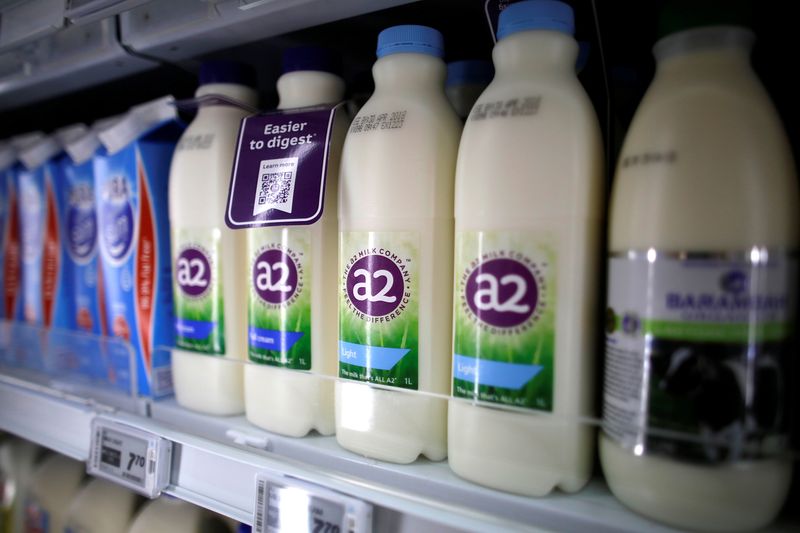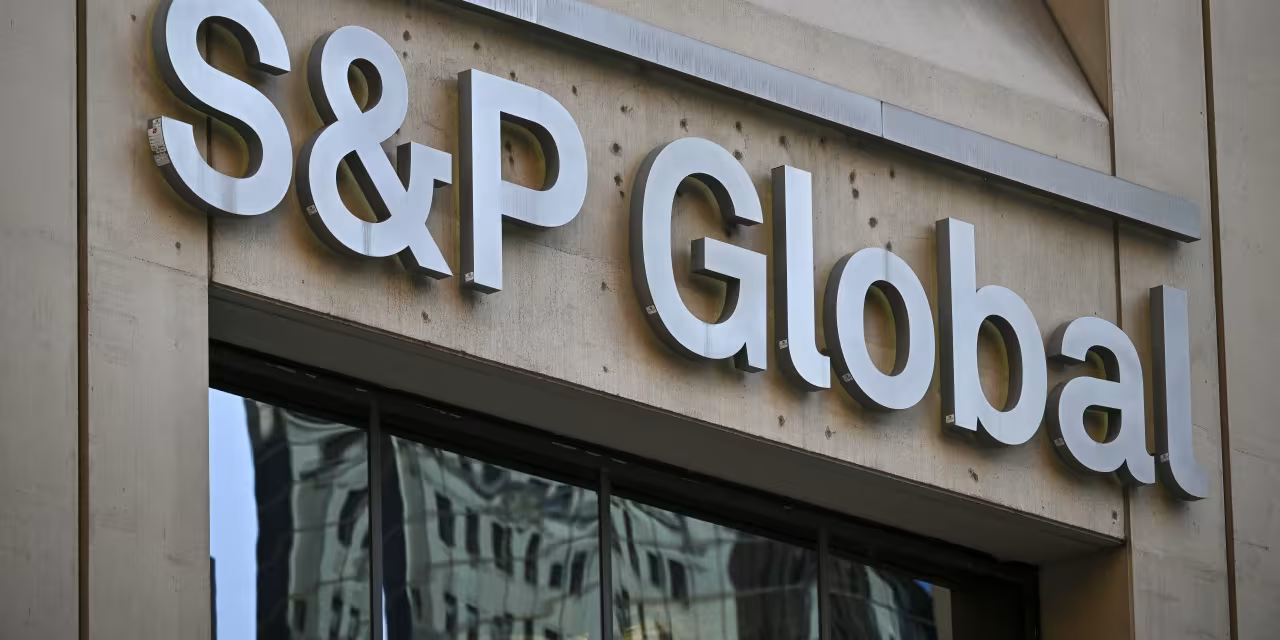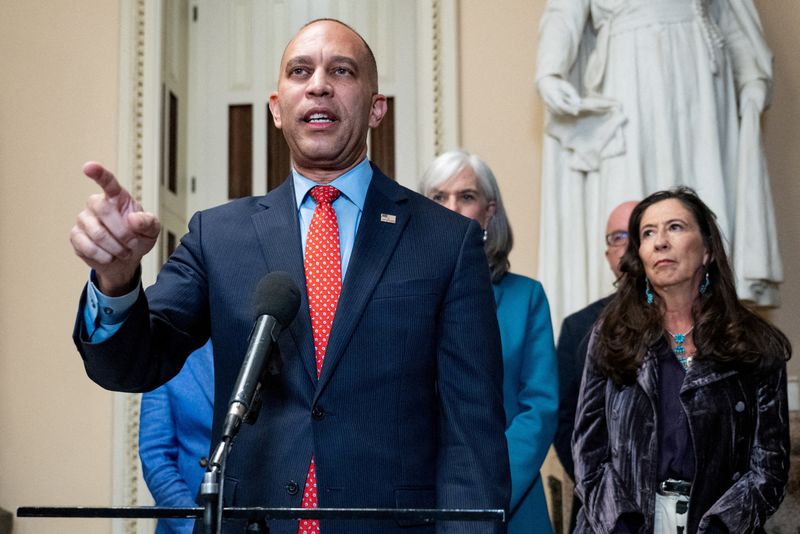Business
BlackRock Global Equity Market Neutral Fund Q4 2025 Commentary

Business
New Zealand home prices dip in January, holiday lull hits demand


New Zealand home prices dip in January, holiday lull hits demand
Business
FBI confirms DNA recovered from glove found near Nancy Guthrie’s home


FBI confirms DNA recovered from glove found near Nancy Guthrie’s home
Business
New Zealand’s a2 Milk posts 9.4% rise in interim earnings


New Zealand’s a2 Milk posts 9.4% rise in interim earnings
Business
Warner Bros weighs reopening sale talks with Paramount, Bloomberg News reports


Warner Bros weighs reopening sale talks with Paramount, Bloomberg News reports
Business
PCE, Walmart, Palo Alto, Analog Devices, Deere, and More to Watch This Week

PCE, Walmart, Palo Alto, Analog Devices, Deere, and More to Watch This Week
Business
An S&P Global International Insider Bought Up Stock

An S&P Global International Insider Bought Up Stock
Business
Boring Company selected for Universal Orlando underground transit

Elon Musk’s Boring Company unveils underground tunnel
Elon Musk’s The Boring Company has been selected to begin negotiations for a proposed underground transit system connecting Universal Orlando’s parks, following a vote by the Shingle Creek Transit and Utility Community Development District Board.
During its Feb. 11 meeting, the board authorized staff to enter contract negotiations with The Boring Company after determining its proposal best met the district’s request for an “innovative, future-ready, point-to-point solution.”
The project is intended to support transportation infrastructure improvements, including the planned Sunshine Corridor and transit needs tied to expansion around Universal Orlando.
The decision does not finalize a contract.
PILOT PROGRAM AT MAJOR AIRPORT TRACKS MOVEMENT, APPROVES INTERNATIONAL FLYERS’ IDENTITY

An all-electric Tesla travels inside a tunnel 40 feet beneath the Las Vegas Convention Center. (Ethan Miller/Getty Images)
Any agreement would still require board approval, and officials said they will evaluate the project’s operational and financial feasibility before moving forward.
Fox 35 Orlando reported that the proposed underground transit system is intended to ease congestion along International Drive by linking Universal’s existing theme parks and CityWalk with Epic Universe, which opened last year.
The local station said the board’s vote comes after months of speculation and a competitive process that included proposals from other firms, such as Glydways.

The entrance portal welcomes guests during a preview day for Universal Epic Universe in Orlando on April 5, 2025. (Patrick Connolly/Orlando Sentinel/Tribune News Service via Getty Images)
While some competitors pitched elevated guideway systems designed to reduce construction time, the district ultimately opted to pursue an underground concept similar to The Boring Company’s “Vegas Loop” in Nevada.
TESLA ATTACK IN LAS VEGAS ‘CERTAINLY HAS SOME OF THE HALLMARKS’ OF TERRORISM, FBI OFFICIAL SAYS

A Tesla drives through the Las Vegas Convention Center Loop during a media preview on April 9, 2021. (Ethan Miller/Getty Images)
CLICK HERE TO DOWNLOAD THE FOX NEWS APP
“I think it would be a new opportunity to lessen traffic load and good for visitors as well,” said resident Scott Heinz, according to Fox 35.
Mary Walters-Clark, another resident, said the move could help ease congestion during peak hours by giving visitors an alternative to navigating heavy traffic and allowing them to better manage their time.
Business
Lazard Enhanced Opportunities Portfolio Q4 2025 Commentary

Lazard Asset Management delivers world-class investment solutions and long-term value for their clients. When clients partner with Lazard, they gain a trusted advocate committed to championing their success and helping them achieve their unique ambitions. Note: This account is not managed or monitored by Lazard Asset Management, and any messages sent via Seeking Alpha will not receive a response. For inquiries or communication, please use Lazard Asset Management’s official channels.
Business
Diamond Hill Select Strategy Q4 2025 Portfolio Review

Diamond Hill Capital Management, Inc. is a wholly owned subsidiary of Diamond Hill Investment Group, Inc. Diamond Hill Investment Group is a publicly traded company, and its shares trade on the NASDAQ (Ticker: DHIL). Note: This account is not managed or monitored by Diamond Hill Capital Management, and any messages sent via Seeking Alpha will not receive a response. For inquiries or communication, please use Diamond Hill Capital Management’s official channels.
Business
Democrats willing to spend tens of millions to reshape Virginia voting maps, top lawmaker says


Democrats willing to spend tens of millions to reshape Virginia voting maps, top lawmaker says
-

 Sports4 days ago
Sports4 days agoBig Tech enters cricket ecosystem as ICC partners Google ahead of T20 WC | T20 World Cup 2026
-

 NewsBeat6 days ago
NewsBeat6 days agoMia Brookes misses out on Winter Olympics medal in snowboard big air
-

 Tech5 days ago
Tech5 days agoSpaceX’s mighty Starship rocket enters final testing for 12th flight
-

 Business7 days ago
Business7 days agoCostco introduces fresh batch of new bakery and frozen foods: report
-

 NewsBeat7 days ago
NewsBeat7 days agoWinter Olympics 2026: Team GB’s Mia Brookes through to snowboard big air final, and curling pair beat Italy
-

 Sports7 days ago
Sports7 days agoBenjamin Karl strips clothes celebrating snowboard gold medal at Olympics
-

 Tech19 hours ago
Tech19 hours agoLuxman Enters Its Second Century with the D-100 SACD Player and L-100 Integrated Amplifier
-

 Video2 days ago
Video2 days agoThe Final Warning: XRP Is Entering The Chaos Zone
-
![Heathrow has said passenger numbers were 60% lower in November than before the coronavirus pandemic and there were “high cancellations” among business travellers concerned about being trapped overseas for Christmas as Omicron spreads. The UK’s largest airport said the government’s travel restrictions had dealt a fresh blow to travel confidence and predicted it was likely to take several years for passenger numbers to return to pre-pandemic levels. This week ministers said passengers arriving in the UK would have to take a pre-departure Covid test, as well as a post-flight test, because of fears about the spread of the new variant. “[The] high level of cancellations by business travellers concerned about being trapped overseas because of pre-departure testing shows the potential harm to the economy of travel restrictions,” the airport said in an update. Heathrow said the drop in traveller confidence owing to the new travel restrictions had negated the benefit of reopening the all-important corridor to North America for business and holiday travel last month. Eleven African countries have been added to the government’s red list, requiring travellers to quarantine before reuniting with families. “By allowing Brits to isolate at home, ministers can make sure they are reunited with their loved ones this Christmas,” said John Holland-Kaye, the chief executive of Heathrow. “It would send a strong signal that restrictions on travel will be removed as soon as safely possible to give passengers the confidence to book for 2022, opening up thousands of new jobs for local people at Heathrow. Let’s reunite families for Christmas.” Heathrow said that if the government could safely signal that restrictions would be lifted soon, then employers at Heathrow would have the confidence to hire thousands of staff in anticipation of a boost in business next summer. The airport is expecting a slow start to 2022, finishing next year with about 45 million passengers – just over half of pre-pandemic levels. This week Tui, Europe’s largest package holiday operator, said it expected bookings for next summer to bounce back to 2019 levels. However, Heathrow said on Friday not to expect the aviation industry to recover for several years. “We do not expect that international travel will recover to 2019 levels until at least all travel restrictions (including testing) are removed from all the markets that we serve, at both ends of the route, and there is no risk of new restrictions, such as quarantine, being imposed,” the airport said.](https://wordupnews.com/wp-content/uploads/2026/02/shutterstock_1100012546-scaled-400x240.jpg)
![Heathrow has said passenger numbers were 60% lower in November than before the coronavirus pandemic and there were “high cancellations” among business travellers concerned about being trapped overseas for Christmas as Omicron spreads. The UK’s largest airport said the government’s travel restrictions had dealt a fresh blow to travel confidence and predicted it was likely to take several years for passenger numbers to return to pre-pandemic levels. This week ministers said passengers arriving in the UK would have to take a pre-departure Covid test, as well as a post-flight test, because of fears about the spread of the new variant. “[The] high level of cancellations by business travellers concerned about being trapped overseas because of pre-departure testing shows the potential harm to the economy of travel restrictions,” the airport said in an update. Heathrow said the drop in traveller confidence owing to the new travel restrictions had negated the benefit of reopening the all-important corridor to North America for business and holiday travel last month. Eleven African countries have been added to the government’s red list, requiring travellers to quarantine before reuniting with families. “By allowing Brits to isolate at home, ministers can make sure they are reunited with their loved ones this Christmas,” said John Holland-Kaye, the chief executive of Heathrow. “It would send a strong signal that restrictions on travel will be removed as soon as safely possible to give passengers the confidence to book for 2022, opening up thousands of new jobs for local people at Heathrow. Let’s reunite families for Christmas.” Heathrow said that if the government could safely signal that restrictions would be lifted soon, then employers at Heathrow would have the confidence to hire thousands of staff in anticipation of a boost in business next summer. The airport is expecting a slow start to 2022, finishing next year with about 45 million passengers – just over half of pre-pandemic levels. This week Tui, Europe’s largest package holiday operator, said it expected bookings for next summer to bounce back to 2019 levels. However, Heathrow said on Friday not to expect the aviation industry to recover for several years. “We do not expect that international travel will recover to 2019 levels until at least all travel restrictions (including testing) are removed from all the markets that we serve, at both ends of the route, and there is no risk of new restrictions, such as quarantine, being imposed,” the airport said.](https://wordupnews.com/wp-content/uploads/2026/02/shutterstock_1100012546-scaled-80x80.jpg) Business6 days ago
Business6 days agoWeight-loss jabs threaten Greggs’ growth, analysts warn
-

 NewsBeat7 days ago
NewsBeat7 days agoResidents say city high street with ‘boarded up’ shops ‘could be better’
-

 Crypto World4 days ago
Crypto World4 days agoPippin (PIPPIN) Enters Crypto’s Top 100 Club After Soaring 30% in a Day: More Room for Growth?
-

 Crypto World2 days ago
Crypto World2 days agoBhutan’s Bitcoin sales enter third straight week with $6.7M BTC offload
-

 Video4 days ago
Video4 days agoPrepare: We Are Entering Phase 3 Of The Investing Cycle
-

 Crypto World6 days ago
Crypto World6 days agoU.S. BTC ETFs register back-to-back inflows for first time in a month
-

 Crypto World5 days ago
Crypto World5 days agoBlockchain.com wins UK registration nearly four years after abandoning FCA process
-
Sports6 days ago
Kirk Cousins Officially Enters the Vikings’ Offseason Puzzle
-

 Crypto World6 days ago
Crypto World6 days agoEthereum Enters Capitulation Zone as MVRV Turns Negative: Bottom Near?
-

 NewsBeat5 hours ago
NewsBeat5 hours agoThe strange Cambridgeshire cemetery that forbade church rectors from entering
-

 Crypto World5 days ago
Crypto World5 days agoCrypto Speculation Era Ending As Institutions Enter Market
-

 Business3 days ago
Business3 days agoBarbeques Galore Enters Voluntary Administration








